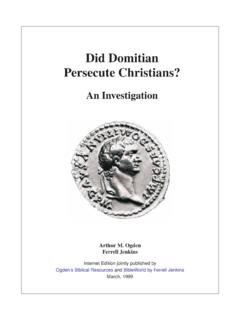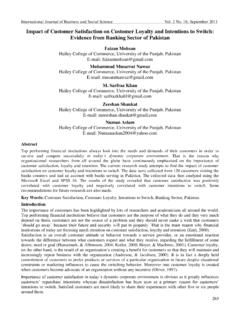Transcription of Intorduction to Prophets - BibleWorld
1 introduction to the Prophets Compiled by Ferrell Jenkins with portions based on The Prophets , class notes by Homer hailey I. Instructors in Israel (Jer. 18:18; Ezek. 7:26). Jer. 18:18 Then they said, `Come and let us devise plans against Jeremiah. Surely the law is not going to be lost to the priest, nor counsel to the sage, nor the divine word to the prophet ! Come on and let us strike at him with our tongue, and let us give no heed to any of his words.' . Ezek. 7:26 `Disaster will come upon disaster, and rumor will be added to rumor; then they will seek a vision from a prophet , but the law will be lost from the priest and counsel from the elders.
2 ' . A. Wise men (sage, elders) counsel. 1. Wise women (2 Sam. 14:1-24; 2 Sam. 20:16-22). 2. The outstanding wise man was Solomon (1 Kings 4:29, 34; 10:4, 23; 11:41; Mt. 12:42). 3. Wisdom literature: Proverbs, Ecclesiastes, Job, Song of Solomon. B. Priests law. The special function of the priests was related to the law. Since the law was civil and ecclesiastical, their function was two-fold: First, to declare and interpret or teach the law; second, to tend the sacrifi- cial duties of worship ( hailey , The Prophets ). C. Prophets word. The mission of the prophet was to communicate to Israel the word of the Lord. They did predict, but as a whole , they were preachers rather than predictors (Knudson, The Pro- phetic Movement in Israel, 16).
3 D. Psalmists. David was the sweet psalmist of Israel (2 Sam. 23:1), and there were other psalmists. II. The Meaning of the Term prophet . This section is taken from Jenkins, introduction to Christian Evidences, 88. A. In the Old Testament the word prophet is from the Hebrew word nabhi. 1. There is uncertainty as to the etymological meaning of this word. a. Several scholars point out that the root word meant to bubble up or bubble forth. b. Some say that the basic idea is to speak, or to announce.. 2. Edward J. Young, the author of several outstanding books dealing with prophecy and the proph- ets, remarked: In all of this learned discussion, however, there is too much uncertainty.
4 To the present writer, it does not seem possible to ascertain the precise significance of the word nabhi upon philological grounds alone (My Servants the Prophets , 57). 3. The best way to learn what the word prophet means is to study its use in the Bible. B. prophet defined by its use in the Bible. The prophet was one who spoke direct for God. 1. The Lord made Moses as God to Pharaoh, and Aaron his brother was his prophet (Ex. 7:1). This is just an analogy. Moses was not the ultimate authority; he could speak only as God com- manded. 2. Exodus 4:16 shows that Aaron was the spokesman or mouth of Moses (who was as God to him). This means that the prophet is God's Spokesman or God's Mouth.
5 3. When God gave His standard for a prophet He said: I will put My words in his mouth, and he shall speak to them all that I command him (Dt. 18:18). C. The term prophet implies that he was a forthteller, but not necessarily a foreteller. A great amount of the work done by these men was to their own generation. introduction to the Prophets 2. III. Other Terms Describing the prophet . A. Seer. 1. This was one of the earliest designations of the Prophets (1 Sam. 9:9; 2 Kings 17:13). 2. Samuel is called a seer (1 Sam. 9:19, 22, et al.). 3. Amos is called a seer (Amos 7:12). B. Man of God (1 Sam. 9:6; 1 Kings 17:18). C. Servant of God (or the LORD) (1 Chron.)
6 6:49; 1 Kings 18:36; Isa. 20:3). D. Messenger of the LORD (Isa. 42:19). E. Watchman (Ezek. 3:17; 33:7). Someone has said that there are two classes of preachers the good preachers who have something to say, and the poor preachers who have to say something. But there is yet another and higher class. It consists of those who both have something to say and who have to say it. Such are the Prophets . (Knudson 30). IV. The Pre-literary (oral) Prophets . A. Founders of the Hebrew Nation. 1. Abraham (Gen. 20:7, 17); Perhaps Isaac and Jacob (Ps. 105:15). 2. Moses (not necessarily a pre-literary prophet ) stands in a class by himself (Dt.
7 18:15-18; 34:10;. Hos. 12:13). 3. Miriam a prophetess (Ex. 15:20). B. The Period of the Judges. 1. Deborah a prophetess (Jud. 4:4). An unnamed prophet (Jud. 6:8). 2. The prophetic groups or sons of the Prophets . The earliest reference we have to these Prophets is in the time of Samuel, in the eleventh century (1 Sam. 10:5-13). A similar company is mentioned in 1 Samuel 19:18-24. After the time of Samuel it was two centuries before the pro- phetic bands came again into prominence; this time in connection with Elijah and Elisha (1 Kings 22:6; 18:13). They were probably religious individuals gathered about an outstanding prophet to study under and imbibe his spirit ( hailey ).
8 See references to the sons of the Prophets in 1. Kings 20:35; 2 Kings 2:3, 5, 7, 15. 3. Samuel the prophet -judge (1 Sam. 1:1 25:1). These were Prophets before the time of Sam- uel, but the institution of the prophetic movement began with Samuel and may be looked upon as an accompaniment of the theocracy (Young, My Servants the Prophets , 79; Acts 3:24). C. The Period of the Kings. 1. From David to the division of the kingdom. a. Nathan. Rebuked David (2 Sam. 12:1ff.); prophesied of the Messiah (2 Sam. 7:1-17);. anointed Solomon (1 Kings 1). b. Gad. Rebuked David for numbering Israel (2 Sam. 24:1ff.). c. Ahijah. prophet to Jeroboam concerning the division of israel and Judah (1 Kings 11:29ff.)
9 D. Shemaiah. prophet to Rehoboam (1 Kings 12:21-24). e. An unnamed prophet a man of God who was sent to Jeroboah (1 Kings 13). 2. From the division of the kingdom to the time of the literary Prophets . a. Jehu. Declared the doom of Baasha (1 Kings 16:1-4). Rebuked Jehoshaphat for his alliance with Ahab (2 Chron. 19:1-3). b. Eliezer prophesied against Jehoshaphat (2 Chron. 20:37). c. Micaiah stood against the false prophet , Zedekiah (1 Kings 22:1-36). d. Elijah and Elisha (1 Kings 16 2 Kings 13). introduction to the Prophets 3. V. False Prophets . Along with the true, there arose false Prophets . They fall into two classes: the mercenary and the political, some prophesying for money, others for political favor ( , Micah 3:5, 11).
10 The primary line of cleavage was national and religious. `Oftentimes nationalistic through ignorance. But the true Prophets did not on that account denounce them and their message any the less severely. An ignorant conscientiousness may be quite as dangerous to a community as deliberate wickedness' (Knudson 24). In such times the true Prophets rise to their greatest heights in zeal and fearlessness ( hailey , The Prophets ). VI. Major Themes of Prophecy. B. D. Napier [in IDB 3:910-19] notes seven themes that dictate action and argumentation in prophecy. These concepts emerge from Israel's history. He claims the Prophets teach that Israel now stands be- tween Egypts, that what she was she will be again.







